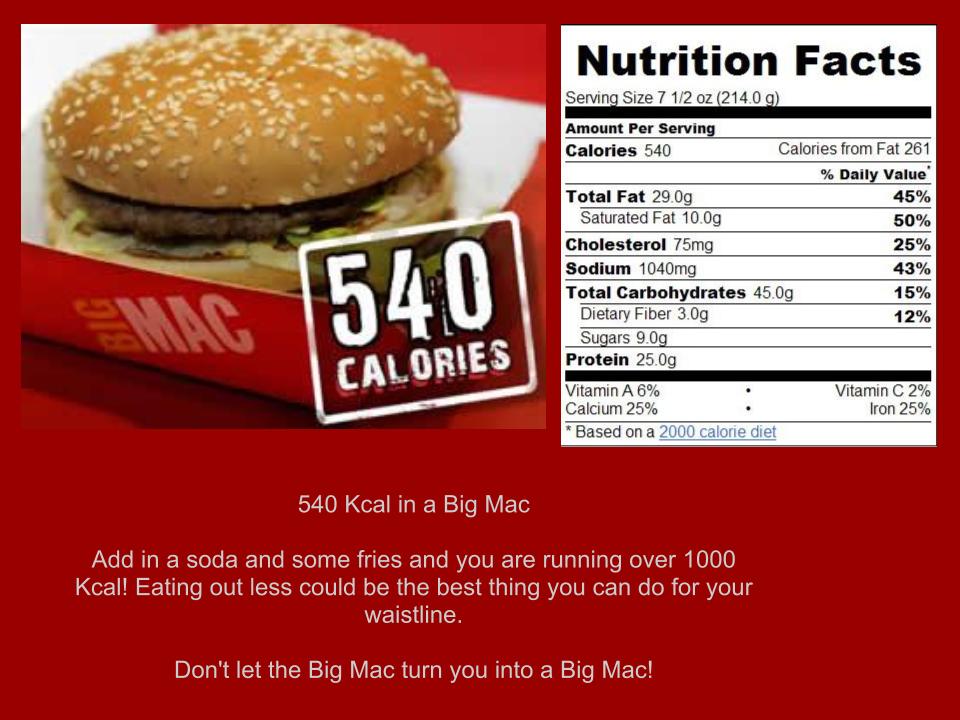When it comes to fast food, few items are as iconic as the Big Mac. However, many consumers are often left wondering about the kilocalories contained within this beloved burger. In this article, we will delve deep into the nutritional profile of the Big Mac, exploring its kilocalories, ingredients, and the implications of consuming this popular meal. Understanding the caloric content is essential for making informed dietary choices, especially for those who are health-conscious.
As we navigate the world of fast food, it's crucial to recognize that the Big Mac is not just a simple burger; it represents a blend of flavors, textures, and a specific caloric intake. This article aims to provide comprehensive insights into how many kilocalories are in a Big Mac, how it fits into a balanced diet, and what you need to know about its health impact.
Join us as we explore the intricacies of the Big Mac's kilocalories, its nutritional components, and some tips for making healthier choices when indulging in fast food. With the right information, you can enjoy your favorite meals without compromising your health.
Table of Contents
- 1. Big Mac Overview
- 2. Nutritional Facts of Big Mac
- 3. Ingredients of Big Mac
- 4. Big Mac vs. Other Fast Food Burgers
- 5. Health Implications of Consuming Big Mac
- 6. Making Healthier Choices
- 7. Conclusion
1. Big Mac Overview
The Big Mac is a signature burger created by McDonald's in 1968. It features two all-beef patties, special sauce, lettuce, cheese, pickles, and onions, all served on a sesame seed bun. Its distinctive taste and unique combination of ingredients have made it a favorite among fast food lovers worldwide.
2. Nutritional Facts of Big Mac
2.1 Caloric Content
A standard Big Mac contains approximately 550 kilocalories. This number can vary slightly depending on location and preparation methods. Here’s a breakdown of the caloric content:
- Total Calories: 550 kcal
- Calories from Fat: 330 kcal
- Calories from Carbohydrates: 220 kcal
2.2 Macronutrients
In addition to kilocalories, it’s essential to consider the macronutrient profile of the Big Mac. Here’s how it breaks down:
- Protein: 25 grams
- Fat: 30 grams
- Carbohydrates: 45 grams
- Sugar: 9 grams
- Sodium: 950 mg
3. Ingredients of Big Mac
The Big Mac is composed of several key ingredients that contribute to its flavor and texture. Here’s a detailed list:
- Two all-beef patties
- Special sauce (similar to Thousand Island dressing)
- Shredded lettuce
- American cheese
- Pickles
- Onions
- Sesame seed bun
4. Big Mac vs. Other Fast Food Burgers
When comparing the Big Mac to other fast food burgers, it’s essential to consider the kilocalories and nutritional content. Here’s how the Big Mac stacks up against some other popular burgers:
- Whopper (Burger King): Approximately 657 kcal
- Double Cheeseburger (McDonald's): Approximately 450 kcal
- Quarter Pounder with Cheese (McDonald's): Approximately 520 kcal
While the Big Mac has a moderate caloric content, it contains a higher fat content than some alternatives, making it essential to choose wisely based on your dietary needs.
5. Health Implications of Consuming Big Mac
Consuming a Big Mac occasionally is generally acceptable for most individuals. However, frequent consumption may lead to several health concerns:
- Weight Gain: Regularly consuming high-calorie fast food can contribute to weight gain.
- Heart Health: The high levels of saturated fat and sodium can negatively impact cardiovascular health.
- Blood Sugar Levels: The carbohydrates and sugars may affect blood sugar levels, making it a consideration for those with diabetes.
6. Making Healthier Choices
Here are some tips for enjoying a Big Mac while still being mindful of your health:
- Consider sharing a meal or opting for a smaller size.
- Pair your Big Mac with a side salad instead of fries.
- Stay hydrated with water instead of sugary drinks.
7. Conclusion
In summary, the Big Mac contains approximately 550 kilocalories and a considerable amount of fat and sodium. While it can be enjoyed occasionally, it's essential to be mindful of its nutritional content and consider healthier options when possible.
We invite you to share your thoughts in the comments below, explore more articles on our site, and make informed choices about your fast food consumption. Your health matters, and knowledge is the first step towards making better dietary decisions.
Thank you for reading! We hope to see you back on our site for more nutritional insights and health tips.
Article Recommendations


